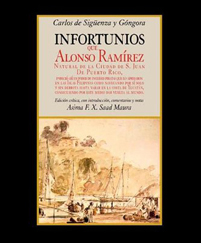Infortunios de Alonso Ramírez (1690), Carlos de Sigüenza y Góngora. Buenos Aires: Stockcero, 2011

Infortunios de Alonso Ramírez (1690), Carlos de Sigüenza y Góngora. Buenos Aires: Stockcero, 2011
In 1690, when Infortunios de Alonso Ramírez, penned by Carlos de Sigüenza y Góngora (1645-1700), was published in Mexico, Spain already seemed to be slipping irrevocably into decadence. At the same time, history marked the epochal hearkening of the leading Puerto Rican character-narrator whose name appears on the title, and of the well-known Mexican writer, mathematician, philosopher, and historian. Both were exemplary subjects of a new hybrid race and creole culture straddling the effects that the conquest and colonization of the New World left across the American continent. To date, scholars have not agreed on its genre and continue to debate whether it is a work of fiction, a historical document, or a first-hand narrative account. In the introduction, Prof. Saad Maura sets forth ideas that touch on the politics, religion, historicity, and aesthetic considerations stemming from the story. The events in the high-seas between the Catholic Ramírez and the protestant pirates (mostly English) invite a reevaluation of the subtle line distinguishing not only truth and falsehood, but also half-truths or pure, creative invention. Besides a full transcription of the original text, our edition includes a bibliographical appendix and extensive footnotes on the nautical terms that appear throughout the novel, making it a sourcebook of maritime history at the end of the 17th century. Having appeared over three hundred years ago, we hope that the current volume will continue to pique the curiosity of 21st-century readers as to the nautical, historical and religious controversies that make up this great work of Hispanic colonial literature.
